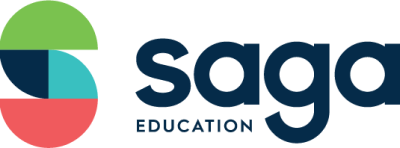Looking back on the academic year and ahead to the future, there is much to celebrate at Saga Education.
We have continued to grow as a trusted, national leader in personalized learning for students. Research and data from the University of Chicago Urban Education labs has validated our impact.
We re-imagined our look, messaging, and digital channels with a bold new brand.

In high schools From Chicago to New York, we are proving that the potential to achieve is universal. That’s why the nation’s leading organizations dedicated to eradicating educational inequity are proud to partner with Saga Education. We received an award of $2,278,800 million in AmeriCorps funding from the Corporation for National and Community Service. We established new partnerships with DC Public Schools, the Clark Foundation, College Board, the Chicago Bears, and the CME Group Foundation. Our portfolio of national and local partners continues to grow, strengthen and flourish. As a result, next school year we will serve more students than ever (3,300+ students in 27 school in 3 cities).
All this would not be possible without our incredible students and dedicated Fellows. The mission and story of Saga continues to revolve around the importance of personal relationships. As we grew this year, we see how the Saga model makes a difference in the lives of students—whether it’s by breaking through a tough math problem or sparking a bit of joy during a hard day.
At Saga, we know data speaks volumes. In reflecting back on this year, we want to celebrate a few key insights that will help us continue to grow and evolve in the future.
1. Foundational Skills Assessment (FSA)
The Foundational Skills Assessment is one of Saga’s internal measurement tools for student success. Based on results from previous school years, our target for this year was for at least 82% of students who received at least 80% of Saga Math Lab dosage to meet the FSA goal by the end of the year; this would be an increase of 5 percentage points over last year's 77%.
We are thrilled to announce that not only did we reach that target, but we surpassed it, with 86% of Saga students with at least 80% dosage meeting the FSA goal.
When we look at results for all students, regardless of dosage received, we also see a significant improvement from 69% of students meeting the goal in 2017-18 to 79% this year.
“Last year we piloted focused skill pushes, where we would send Saga Tutoring Fellows specific supporting material on key skills to prioritize with their students during the year. This year, our Academics Team revamped our foundation skills support materials, and our Data Team further developed data infrastructure to provide our Tutoring Fellows with faster and more specific data for each of their students,” said Chris Dupuis, Chief Operating Officer. “These things in sum contribute to the highest growth measures we’ve seen in our history of giving the Foundational Skills Assessment.”
2. Blended vs. Traditional Learning Models
Starting in the 2017-18 school year and continuing into 2018-19, Saga rolled out “blended learning” models to a portion of its tutoring sites. The blended learning model included an online learning software component, where students would spend time during their tutorials practicing math skills and completing assessments on a computer.
When controlling for baseline differences between the groups, we see equivalent outcomes on the Foundational Skills Assessment for students at Blended Learning sites and students at Traditional sites.
While the ultimate data needed to prove the effectiveness of the Blended Learning model will come from the University of Chicago’s randomized controlled trial, this preliminary data gives us confidence that transitioning to mostly Blended Learning sites in the 2019-20 school year is the right approach — allowing us to reach more students through an equally impactful program model.
“Rolling out the Blended Learning model this year was an enormous task,” said Dupuis. “We’re seeing that our students are succeeding just as well at Blended Sites. I’m super proud of the entire team who worked collaboratively to make this happen. It’s a big win for the program and for a greater number of students served.”
3. Student survey results
Our end of year survey gives students a chance to reflect back on their experience in the Saga program.
Students who participated in Saga Math Lab reported a 20% increase in their confidence in their math abilities from the beginning to the end of the school year, as well as an 18% increase in their comfort level participating in their math class.
"Illyana has been making such great progress in her confidence. She is more sure of her answers and has volunteered to do a problem or share an answer without my asking. There have been times in the past when she became disheartened when she got the wrong answer, but these last 2 weeks, she has gotten into a "let me try it again" attitude." Veronica Tenesaca, Saga Education Fellow, 18-19
Students who participated in Saga Math Lab also reported an 11% increase in the extent to which they like math.
"Angely started out thinking math lab would be easy and pointless, but she's really been leveraging our time together to clarify opaque points in math or connections with health sciences (she's interested in becoming a nurse, and is fascinated by math connections to that subject area)." -Anthony Onica, Saga Education Fellow, 18-19
This is a very exciting time for us at Saga and we are looking forward to another year of success, exploration and development.
Want to get involved?
There are still Saga Tutoring Fellow openings in Washington DC, Chicago, and New York City for the 2019-20 academic year. Apply now to spend a service year building powerful relationships that lead to student success. Learn more
